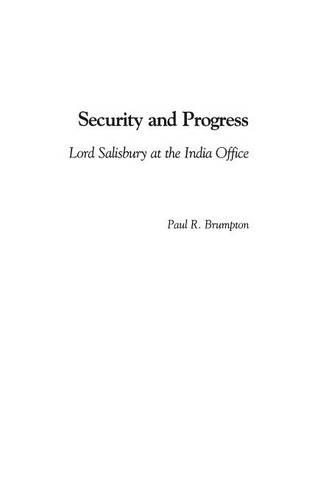
Security and Progress: Lord Salisbury at the India Office
(Hardback)
Publishing Details
Security and Progress: Lord Salisbury at the India Office
By (Author) Paul R. Brumpton
Bloomsbury Publishing PLC
Praeger Publishers Inc
30th December 2002
United States
Classifications
Tertiary Education
Non Fiction
National liberation and independence
Biography: historical, political and military
European history
Asian history
Central / national / federal government policies
941.081
Physical Properties
Hardback
272
Width 156mm, Height 235mm
539g
Description
In the wake of the Indian Mutiny, the 1860s and 1870s marked an important period of change and imperial consolidation for the British. In this text the author examines the imperial policy of Robert Cecil, the third marquis of Salisbury, who served as secretary of state for India for two administrations during this key era, which marked a significant turning point for relations with the local princes. Salisbury was responsible for policies designed to ensure the smooth running of an empire whose administration was made more difficult by the British Parliament, which possessed the right to oversee Indian affairs. Salisbury would carry with him ideas developed at this time to his future post as foreign secretary and prime minister.
Reviews
[A] vivid insight into the thinking that supported British rule in India through the pen of one of the most erudite and influential political figures of the nineteenth century.-The International History Review
[R]eaders interested in the interplay between policy and personality in the late Victorian era will find much of value in this study of Salisbury at the India Office, and one can hope that it will incite others to pursue the question of how as historians we can reconcile personality, ideology, and policy.-Victorian Studies
Brumpton's examination of Salisbury's Indian Office sojourns should be of great interest to historians of Britain's politics and empire, as well as to anyone interested in the intellectual foundations of contemporary security studies....Brumpton has rectified a very considerable shortcoming in the literature in British imperial and political history. He offers much in this book to help clarify Salisbury's very deliberate refinement of the peculiar system of dual government and semi-indirect rule that had descended from Macaulay's "strangest of all governments...designed for the strangest of all empires."-Journal of Modern History
"A vivid insight into the thinking that supported British rule in India through the pen of one of the most erudite and influential political figures of the nineteenth century."-The International History Review
"Readers interested in the interplay between policy and personality in the late Victorian era will find much of value in this study of Salisbury at the India Office, and one can hope that it will incite others to pursue the question of how as historians we can reconcile personality, ideology, and policy."-Victorian Studies
"[A] vivid insight into the thinking that supported British rule in India through the pen of one of the most erudite and influential political figures of the nineteenth century."-The International History Review
"[R]eaders interested in the interplay between policy and personality in the late Victorian era will find much of value in this study of Salisbury at the India Office, and one can hope that it will incite others to pursue the question of how as historians we can reconcile personality, ideology, and policy."-Victorian Studies
"Brumpton's examination of Salisbury's Indian Office sojourns should be of great interest to historians of Britain's politics and empire, as well as to anyone interested in the intellectual foundations of contemporary security studies....Brumpton has rectified a very considerable shortcoming in the literature in British imperial and political history. He offers much in this book to help clarify Salisbury's very deliberate refinement of the peculiar system of dual government and semi-indirect rule that had descended from Macaulay's "strangest of all governments...designed for the strangest of all empires.""-Journal of Modern History
Author Bio
PAUL R. BRUMPTON teaches history at the University of Leeds.
